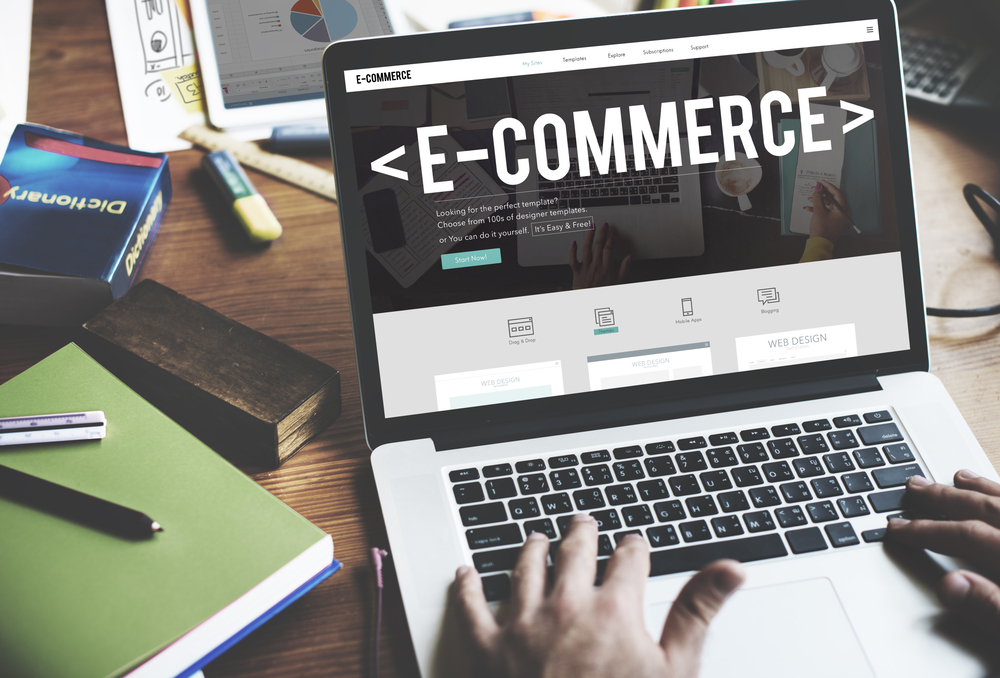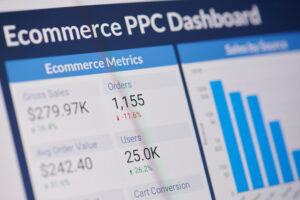
With 2.14 billion buyers purchasing services and products online, e-commerce is the need of the hour.
Nowadays, consumers worldwide decide to purchase more and more products online rather than going to purchase them in-store.
From small businesses to established brands, every company can enjoy the benefits of implementing e-commerce on their website.
In this blog, you will learn how to implement and promote e-commerce and see the benefits that it can bring to your business.
- The Relevance of Online Shopping
- What is E-Commerce and E-Commerce Marketing
- The Importance of E-Commerce and E-Commerce Marketing
- How to Implement an E-Commerce Solution on Your Website
- How to Promote using E-Commerce Marketing
- Some of The Benefits of E-Commerce

The Relevance of Online Shopping
In this contemporary world, when almost half of the world population can be found online, e-commerce has become an integral part of the buying and selling process. Nowadays, about 85 percent of consumers conduct online research before making a purchase online and approximately 25% of people worldwide are online shoppers. Though many still shop from brick-and-mortar stores, online shopping is growing rapidly year over year. Currently, approximately 56% of Gen Xers and 67% of millennials are online shoppers and this percentage is expected to rise with time.
With trends suggesting a continuous increase in online shopping, e-commerce has now become a very important aspect of many companies’ business processes.
What is E-Commerce and E-Commerce Marketing

As most of us know, an e-commerce platform is an online shopping medium that allows consumers to buy products from retailers electronically.
Now, you may not be aware of what e-commerce marketing entails.
E-commerce marketing, on the other hand, is the process of using digital marketing tools to bring new customers to the online store, enhance their shopping experience and encourage them to buy products. Some of the digital marketing tools that can be utilized to conduct e-commerce marketing are social media platforms, search engines, content marketing and email marketing. Thus, e-commerce marketing can be considered as a method of increasing traffic and sales by promoting products to its appropriate audience.
The Importance of E-Commerce and E-Commerce Marketing

Customers no longer solely rely on word of mouth to make their purchasing decision. Today’s buyers often use online stores to facilitate and enhance their purchase. Here, e-commerce and e-commerce marketing plays a crucial role in attracting, converting and retaining the customer.
Having strong e-commerce activities for your business is the first step towards online sales. However, with the growing number of online stores, your company must find ways to stand out. This is where e-commerce marketing comes into play.
E-commerce marketing focuses on incorporating different digital marketing tactics to encourage prospects to visit your online marketplace. Once prospects are on the store, e-commerce marketing enhances the customer experience to increase the likelihood of converting these prospective clients. Finally, once the customer has finished his purchase, e-commerce marketing takes the necessary measures to retain as many clients as possible and turn them into returning customers.
How to Implement an E-Commerce Solution on Your Website

In today’s competitive market, implementing e-commerce into your website can work wonders for your company sales. There are two main ways to implement e-commerce, the first is by doing it yourself and the second is by hiring a professional.
Option 1: Do It Yourself
For those of you thinking of implementing e-commerce yourself, here are the basic steps you’ll have to follow.
Make a Strategy
The very first step in building a strong e-commerce website is creating an effective strategy. As you grow your business, it is important to consider your environment, and plan a strategy accordingly. When drafting your plan, consider your target audience, goals you want to achieve and how you will measure the progress of these goals. This will let you prioritize the right e-commerce strategy that suits your business best.
Choose the Right Platform
Selecting the right platform to host an e-commerce site is crucial for its success. There are hundreds of different e-commerce platforms to choose from, each with their own complexity. However, while determining the platform that best suits your business, remember to consider the 6 following factors.
- Available themes
- Features
- Payment options
- Security
- Technical support
- Price
Decide on Pricing & Payment Options

As you are investing in building an e-commerce website, don’t forget to consider the payment and pricing aspects of your business. Note down how you will price each of your products and consider which method of payments your customers will have access to. There are many pricing factors that come with selling your product through an e-commerce website. Transaction security is also extremely important to consider. Make sure you collaborate with reliable payment software and gateways so that your customer’s bank account details remain secure and confidential.
Design Your Store
Once you are done planning, the next step consists of designing the website. Be particular about the design and content of the webpages. Each product should have a strong name, description and images to attract viewers to the fullest. Be sure to precisely indicate important aspects of each product such as the price, available quantity, shipping options and more.
Create a Checkout Experience
Though this is the final step, it plays an important role in converting and retaining your customers. The better your checkout experience is, the more likely the customer will be satisfied with their purchase and become a returning customer. Make sure your checkout provides customers with all the information they are looking for and avoid any unwanted surprises.
Option 2: Hire a Digital Marketing Agency or Freelancer
Seems all a little too complicated for you? Then, you might want professional help.
A digital marketing agency or a freelancer that specializes in e-commerce can help you implement an ideal online store for your business. Designing a professional online store is challenging. If you do not feel comfortable taking the steps to implement your own high-quality online store, hiring professional help is highly suggested.

How to Promote using E-Commerce Marketing
Now that you have successfully built your e-commerce website, it’s time to market your online store to your target audience. This is where e-commerce marketing comes into play. It allows you to promote your products and increase both traffic and sales on your e-commerce.
E-commerce Marketing can be separated into two groups – off-platform and on-platform promotions. The goal of the first group is to attract people to your e-commerce and the goal of the second group is to encourage people to purchase once they are on your e-commerce.
Off-Platform Promotion
Before people purchase from your online store, they need to be made aware of it. Your 20, 30, 40% discount on your product won’t be seen if there is a lack of an off-platform plan. Some of the top off-platform promotion tactics to make your e-commerce marketing strategy successful are:
- Social Media Marketing
- Affiliated Marketing
- SEO (Search Engine Optimization)
- Email Marketing
- PPC (Pay-Per-Click Marketing)
- Display Advertising
- Content Marketing
- Video Marketing
Each tactic can be adapted to promote your sweet line of products. For example, various social media channels have tools you can use to leverage the goods you sell. On Instagram, you can include product tags in your pictures to provide quick and accessible information to facilitate purchase decisions.
On-Platform Promotion
Once people are on your e-commerce, they might need that extra push to buy a product. You can try multiple promotion tactics to induce a purchase. Some examples are:
- Discounts
- Coupons
- Up-selling
- Cross-selling
- Flash sales
- Free shipping
Each of these can be adapted to your goals. For example, if you’re having a hard time selling a complementary product you can try to cross-sell with a bundle package that comes out cheaper than buying individually.
Each of these tactics has its own pros and cons and are effective in their own ways. The promotion tactics you choose to pursue must be relevant to your business and best suit your business environment. If you succeed to include effective e-commerce marketing tactics in your strategy, you are likely to drastically improve the performance of your e-commerce.
Some of The Benefits of E-Commerce

If you’re still unsure if e-commerce and e-commerce marketing is worth investing in, take a look at some of the strongest benefits that come from it.
Convenient and Easy
The e-commerce shopping experience is convenient, easy and user-friendly. It allows consumers to make purchases 24/7 from whichever location is convenient for them. For this reason, it often generates more leads and allows for more sales than brick-and-mortar stores.
Global Sales

E-commerce lets a local business reach out to consumers globally. Gone are the days when services of a physical store were limited to a certain geographical location. With the help of e-commerce and e-commerce marketing, companies can break down borders to attract and sell to consumers worldwide.
Product Details
E-commerce platforms allow retailers to provide endless product details. On the store, you can include a description, images, reviews, pricing information, Q&As and more. This enhances the user experience and helps consumers make the right purchase decision.
Lower Operational Costs
E-commerce helps businesses save on operational costs. Thanks to the web-based management system, companies can reduce the cost of general expenses such as staffing, renting, inventory and so on.
Understand Customers
E-commerce websites are also helpful in analyzing the buying behaviour and trends of customers. Consequently, businesses are able to track their audience’s buying habits and improve their products and promotional techniques based on the feedback they receive.

Make More Sales
Implementing e-commerce along with e-commerce marketing can, of course, have a very strong impact on your sales. With an effective strategy, your company could substantially increase profit and ROI. According to a study, e-commerce was responsible for around $3.5 trillion in sales in 2019, which is expected to reach $4.9 trillion by 2021. Which means the number is expected to grow by 18% year over year.
After all, implementing e-commerce and e-commerce marketing for your website can lead to a plethora of valuable benefits. The sooner you can adapt your company to the online buying trends, the sooner you will be able to tap into these benefits.



